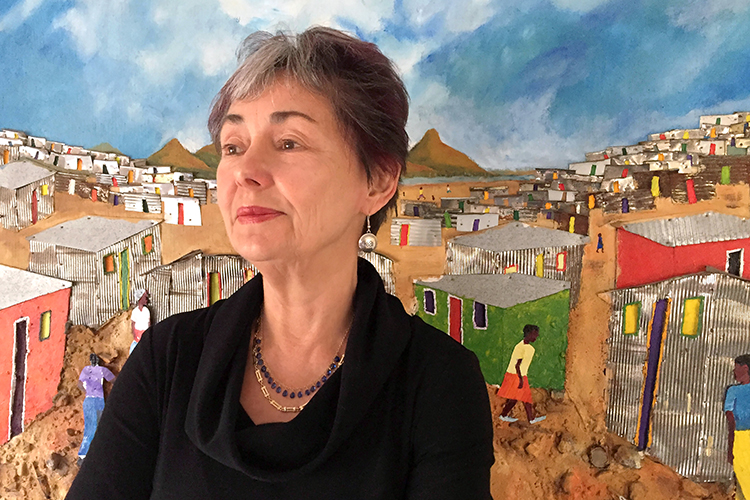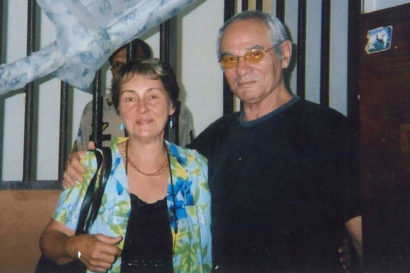Celebrating ‘barefoot anthropology’ — a Q&A with Nancy Scheper-Hughes
To honor her work, Berkeley’s Department of Anthropology is holding a two-day conference on May 1 and 2 called “Anthropology on the Front Lines."
April 28, 2017
For more than five decades, UC Berkeley anthropologist Nancy Scheper-Hughes has worked tirelessly to expose “uncomfortable truths” across the world, from a village in Ireland, where she explored the symptoms of the community’s decline, to a town in northeast Brazil, where she studied impoverished mothers who let go of their angel babies, perceived as creatures who “wanted to die.” For the past 15 years she has been studying an international kidney trafficking circuit.

Nancy Scheper-Hughes is a professor of medical anthropology emerita at UC Berkeley. (Photo by Michael Hughes)
To honor her work, Berkeley’s Department of Anthropology is holding a two-day conference on May 1 and 2 called “Anthropology on the Front Lines,” bringing together a host of scholars who are also activists, many of whom have collaborated with or been mentored by Scheper-Hughes over the years, to talk about how they work when they’re on the ground.
Berkeley News spoke with Scheper-Hughes about the philosophy she lives and works by and the role she thinks anthropologists should play in society.
Berkeley News: What can we expect at this conference?

Scheper-Hughes with friend Dona Biu, from the Alto do Cruzeiro, Timbauba, Brazil in 1987. (Photo courtesy of Nancy Scheper-Hughes)
Nancy Scheper-Hughes: The people at the conference have serious political commitments and they’re not all compatible. But we will feel free to disagree openly using tools of conviviality. We can disagree, even with heat, but with the sense that we are all trying to do some good in the world.
Marcelo Suarez-Orozco was a brilliant student — I came to Berkeley when he was finishing his dissertation on Central American youth who had migrated to the U.S. Marcelo was a young refugee of the Argentinian “Dirty War.” I was an informal mentor to him and invited him to write an article on what happened to children during the war from 1974 to 1983. Today he is a global phenomenon. He gave up prestigious appointments at Harvard and NYU to be the dean of UCLA’s School of Education, where he has transformed what a public university can do.
Another is Margaret Lock, a professor emerita of medical anthropology at McGill University. We were doctoral students together at Berkeley and afterwards we co-invented a new field: critical and interpretive medical anthropology, rooted in a radical phenomenology of the body not as one “thing” but as multiple, local and deeply subjective bodies. In Canada, Margaret has continued to shape the field and has moved from a phenomenological anthropology to a hardcore but still very critical study of science, technology and medicine.

Scheper-Hughes with a trafficked kidney seller in Brazil in 2008. (Photo courtesy of Nancy Scheper-Hughes)
You call yourself a “barefoot anthropologist.” Can you explain what this means?
Anthropology has to be done with our feet on the ground. You’re grounded, you’re really there. This doesn’t mean that you’re not theoretical but it’s theory in action. It also means not being caught up in the machine that academic institutions often create. There was a movement in Latin America, first developed in Brazil, called liberation theology — a “barefoot theology” that was extremely politicized. You had a preferential option for the poor, the excluded, the marginalized. You didn’t worry about the afterlife. You didn’t worry about losing God in heaven. You worried about losing people on Earth. I tried to translate that into a new practice of barefoot anthropology.
To understand the people you’re working with, how do you approach a community?
I have always lived in the communities that I’ve worked in. You begin as neutral as possible, hardly knowing what are the right questions to ask. You might have the wrong questions and your proposal might have to be turned upside down. We try to respect all of our anthropological subjects, but at some point you have to decide where you’re going to draw the line and be critical. I tend to expose structural violence — invisible forms of violence — rather than violent individuals. But what we bring to the surface might mean offending a certain class of people.

Scheper-Hughes with Gadalya “Gaddy” Tauber inside his prison cell. (Photo courtesy of Nancy Scheper-Hughes)
Your work is daring, and often controversial. Have you ever become close with people you had to be critical of?
Gadalya “Gaddy” Tauber was one of the biggest organizers of an international kidney trafficking circuit. He got caught in Recife, Brazil, and went to prison, in part, because of some of my writings. I didn’t name him — I never mention names before a person has been arrested. I just explained how the trafficking system operated. I testified before the Brazilian Congress, U.S. Congress and the South African Commercial Crime police in Durban. In the end, I had to say, “Gaddy, you’re a fascinating person. You have a unique position on why you think it’s okay to recruit poor people from the slums of Brazil and send them to South Africa to have their kidneys removed for sick people coming from Europe, Israel and the U.S., but I still disagree with you.”
I spent two summers visiting Gaddy in prison. He even read my book Death Without Weeping, and gave me a new lens to interpret life in the shantytown based on his own experience of the Holocaust.
I befriended many of the people who got caught up in organ trafficking — the doctors who were doing it, the brokers who set it up, the patients who thought it was okay to travel across the world to have an illegal transplant package for $120,000. It takes some 28 people to carry off an illegal transplant. People you least expect to understand can touch you in such a way that you’re a better person because of them.

Scheper-Hughes with kidney transplant patients at UCT Medical School in South Africa. (Photo courtesy of Nancy Scheper-Hughes)
What do you see as the responsibility of an anthropologist?
Anthropology is an intimate practice. It is a work of careful translation. We might have our biases, but we try to see each individual who works with us as a gift. They may be radically different in their ways of being in the world, just as we are radically different to their world, but if we work hard enough, we can almost always learn to understand each other. Anthropology is a vocation based not necessarily on love, but rather on a deep curiosity that is open to many surprises. It doesn’t mean you have to justify what they’re doing. It doesn’t mean that you always have to please people. Our job is to understand the way people think, the way they live in the world. You just never know whom you’re talking to.
In addition to “Anthropology on the Front Lines,” the Phoebe Hearst Museum of Anthropology is showing “The Welfare of Tomás Ó Hallissy,” by 2014 Turner Prize recipient Duncan Campbell, on May 5. The showing will be followed by a panel discussion. Both events are open to the public.
Learn more about the conference online and on the campus’s events calendar. There is also more information about the film showing available online; registration is requested.
Learn more about Scheper-Hughes on the anthropology department’s website.